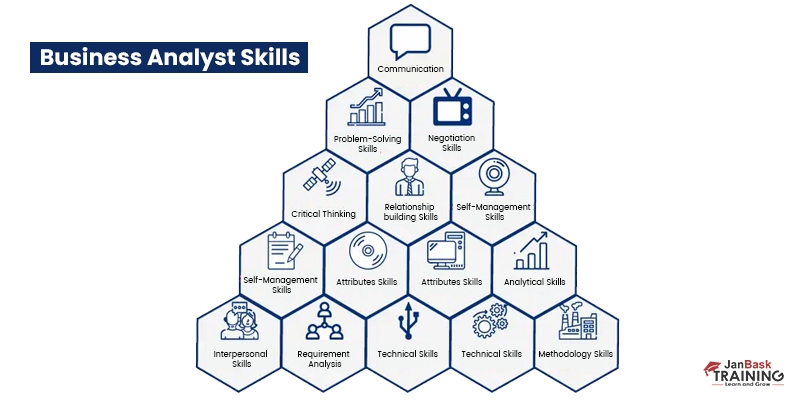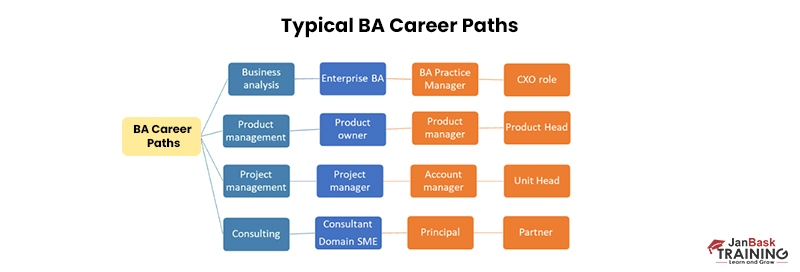Introduction
In today’s digital world, businesses need to be astute and fast in order to keep up with the pace of change. Business analyst is one of the key roles required to support businesses by adopting an agile methodology. A business analyst is responsible for analyzing and understanding the needs of an organization and its customers, which then drives the creation of new products or services that meet those needs.
Becoming a successful Business Analyst means developing the right skills to thrive in this role. This blog discusses the top professional skills that every business analyst should have, job role of a business analyst and career outlook as a Business Analyst.
Let us understand who is a business analyst and learn about Business Analyst In-Demand Skills and Become An Expert in this field by enrolling in Business Analyst Training & Certification.
Who Is A Business Analyst?
A business analyst is someone who is responsible for analyzing an organization’s business activities and identifying ways to improve efficiency and effectiveness. In order to do this, business analysts must have strong analytical and problem-solving skills. They must be able to understand complex systems and processes, and be able to clearly communicate their findings to others.
Business analysts usually work closely with project managers and other stakeholders to ensure that projects are completed on time and within budget. They may also be involved in the development and implementation of new systems and processes. If you’re looking to improve your organization’s efficiency and effectiveness, then a business analyst may be the right career choice for you. There are various types of business analysts depending upon their expertise and the model they work in.
Let’s have a look at them quickly.
- Descriptive Analytics- Descriptive type of analytics helps to summarize the raw data by the help of a real-time dashboard so that experts can get proper analytics.
- Diagnostic Analytics- Campaign/ Diagnostic analytics observes the previous performance to determine the cause-effect relationship.
- Predictive analytics- Prediction methods along with statistical modelscab be used to forecast the accounts of big data instances.
- Prescriptive analytics- Prescriptive analytics concentrates on providing details solutions for specific business queries.
Business Analyst Job Description
Today, with the growing advancement in the IT sector, Business Analysts have taken the frontseat of the business world. Business Analysis means comprehending the transforming business requirements, calculating the effect of these transformations, knowing and analyzing the business expectations and documenting and allowing smooth interaction among the stakeholders. Business Analysts are referred to as Agents of Change. The analysts help the company to maximize the profit margin, refining the business process and the quality of products.
The roles and responsibilities of a business analyst which the companies require have been mentioned below:
- Assessing business processes, forecasting expectations and giving solutions.
- Staying aware of the advance technologies to upgrade the efficiency of the business process..
- Budgeting and predicting.
- Organizing and observing projects properly.
- Executing market research and proper analysis.
- Daily reporting and Analysis.
- Controlling competing resources
- Leading and controlling teams.
Business Analyst Core Skills That Are Essential To Grow Your Career
A Business Analyst is required to perform multiple duties to enhance the performance of organization and maximize its value for their stakeholders. Here are some business analyst core skills, both technical and non-technical, to help you grow your career:

1. Technical Skills - Technical skills of business analyst don’t imply coding skills. This requires interacting properly with technical teams is essential. The technical skills required for a Business Analyst is the creation of reports and dashboards. It also includes proficiency in Tableau, QlikView and Power BI to make different reports as per the business requirements.
As A Business Analyst, you will have basic understanding of business analysis framework and techniques, SDLC Models, Stakeholder Identification & Management, Business Mapping and modelling and critical analysis of business processes.
2. Database and SQL Skills - Business Analysts most frequently use structured data. So, they should be well-versed in relational databases like Microsoft SQL Server, MySQL, Oracle DB, as well as NoSQL databases in order to store and process this large amount of data. Database and SQL Skills will help you access, retrieve and manipulate data.
3. Programming Skills - To perform better data analysis, business analysts need have programming expertise. Knowledge of Python and R is useful to solve complex problems. These languages will help in data visualization & data manipulation. These programming languages can be used to examine massive data. It is beneficial to have a sound understanding of statistical software like SAS and SPSS.
4. Data Analysis Skills - Business Analysts must be able to visualize data and turn it into value. They must consider developing data analytic skills such as SQL skills, Business Skills, Excel Skills
A Business Analyst must also have the Basic knowledge of relational databases and the skills to retrieve, manipulate and analyze data.
5. Managerial Skills - Managerial business analyst skills can help BAs to support and lead the workforce through change. These skills help a BA deal with their subordinates well. This allows easy flow of activities in the organization. There are some managerial business analyst skills needed for every BA that includes Team Work, Planning, Motivation and Collaborative Working.
6. Organizational Skills - A business analyst should be able to understand the objectives of a company. Business analysts benefit from having domain knowledge about the organization in which they work. This will make it easier for them to reach their deadlines. Some essential organizational business analyst skills needed are Project Management, Time Management and Goal Setting.
7. Good Interpersonal and Communication Skills - A good business analyst must communicate effectively. This will facilitate in working sessions and web meetings. You'll be familiar with a wide range of documentation requirements. Having able to successfully communicate can help you stand out! For Example, You can ask the appropriate information from stakeholders with extreme clarity.
8. Logical Skills - A business analyst must examine and understand the client's needs. A business analyst should apply critical thinking to assess alternative options. A BA can prioritize company requirements due to critical thinking. Even when resources are limited, a business analyst with a strong analytical bent will be able to achieve the specified objectives.
9. Decision-Making Skills - The decision making skills of business analyst can influence the company's business management. So, a Business Analyst should consider all factors before making a decision. A business analyst analyzes the issue and incorporates strategic planning. Business analyst skills needed to make the decision if a technological design meets the company's needs.
10. Tactful Problem-Solving Skills - Tactful business analyst skill set will help you grow as a problem solver and analyzer. Organizations are on the lookout for proactive business analysts. They want
Business Analysts who can anticipate issues and look forward. The BAs who can develop ways to lessen the risk of these issues arising. Thus, proactive problem-solving skills will help a Business Analyst analyze the problems and opportunities effectively. Some business analyst skills to focus in this area are Active listening, Analytical Thinking, Attention To Detail and Anticipating the Future.
11. Documentation - Documantation skills of business analyst is required for analyzing data, creating reports, and preparing documentation on the grounds of the data given. Documentation skills of business analysts come handy in team meetings to explain their point clearly. A business analyst skill set of documentation and presentation seems lucrative to the clients. Knowledge on tools like MS PowerPoint and MS excel allow the analyst to produce impressive documentation.
12. MS Excel- Excel is definitely one of the popular analytics tools used by business analysts to perform multiple calculations, create reports and execute budget analyses to identify ongoing business trends. This is a spreadsheet which helps manage the data smoothly. Being skillful in MS Excel, the analyst can calculate the parameters needed by just using the right formula. This is a simple tool also used to make desired business decisions.
13. Statistics and Probability - This technical skill is a must have for any business analyst. A business analyst is responsible of searching solutions from the information, hence the knowledge of statistics and probability will allow them to reach proper solutions and have a clear comprehension of data to arrive at perfect assumptions. Statistics also allows the analyst to analyze previous results and forecast future performance and probability allows him to make decision by analyzing the patterns received from the data in hand.
14. Critical thinking - Critical thinking skills of business analyst fulfill the client’s demands through proper data analysis. They need to analyze the data on the basis of various aspects and focus on the business demands. They must also focus on the method of the collected data because flawless data will produce appropriate outcome. Thus, to meet the expectations of the client, the analyst must develop critical-thinking skills.
15. Negotiation and cost-benefit analysis - A business analyst needs to negotiate at every stage to decide the content they need to incorporate in the project. Negotiation skills are also beneficial to arrive at technical conclusions and to identify the requests that change into expectations and priority. It further decides the functional infrastructure that meets the client’s needs. A cost-benefit analysis is done by the analysts to estimate the costs and benefits that can come from a specific project. They utilize this skill to decide if they should invest on those projects.
16. Creating reports and dashboards - Business analysts need to be skillful while implementing business intelligence tools to make reports and dashboards which settles the issues related to decision-making. An analyst needs to have insight of Tableau and Power BI to create multiple reports as per the project requirements.
17. Time management- Time management skills is very important for business analysts because their work schedule is heavy and they need to be sure that they execute every task prior to the deadline. Prioritizing the urgent tasks and planning the day accordingly is a vital step in time management. The analyst also needs to do various jobs simultaneously, saving time for other tasks. Hence, he also needs to possess multi-tasking skills to balance the professional and personal space.
A competent Business Analyst must possess both soft skills and business analyst hard skills.
So, these are the business analyst basic skills that are essential to growing as a productive Business Analyst in any organization.
How To Equip Yourself With Business Analyst Skills To Grow Your Career?
Let us explore the top 8 Ways To Equip Yourself With Business Analyst Fundamentals.
- Enroll for the right certification
There are many ways to equip yourself with business analyst fundamentals. One way is to enroll in a business analyst certification program. These programs are designed to teach you the skills and knowledge you need to be a successful business analyst. Many programs offer courses online, so you can study at your own pace and complete the program at your convenience.
Another way to learn business analyst fundamentals is to read books on the subject. There are many books available that cover the basics of business analysis. You can also attend workshops and seminars on business analysis. These events can provide you with the required exposure and help you network with other professionals in the field.
- Prepare well for the Interviews
When you are interviewing for a business analyst role, it is important to be able to demonstrate your knowledge of business analyst fundamentals. You must be prepared well for your business analyst interview questions. It will help you demonstrate your knowledge and discuss a business analysis project that you have worked on in the past. This will show that you have practical experience with the work of a business analyst. Finally, it is also helpful to be familiar with the different tools and techniques that are used in business analysis. This will show that you know how to put theory into practice.
- Get To Know More On Networking Basics
One of the best ways to equip yourself with business analyst fundamentals is to network with other business analysts. You can join a professional organization for business analysts, such as the International Institute of Business Analysis (IIBA) or the Association for Systems Management and Planning (ASAP). These organizations offer networking opportunities, resources, and education for business analysts.
You can also attend conferences and events related to business analysis. This is a great way to meet other business analysts and learn about new trends and developments in the field. Third, you can connect with other business analysts online. There are many online forums and communities where business analysts can connect and share information. LinkedIn is a great place to start connecting with other business analysts. Networking with other business analysts is a great way to get started.
- Getting Outside Your Comfort Zone
One of the best ways to equip yourself with business analyst fundamentals is to get outside your comfort zone. This means learning new things and expanding your business analyst skillset. There are a few ways you can do this.
Take on new projects at work. If you're comfortable with the basics of business analysis, challenge yourself by taking on more complex projects. This will help you hone your skills and learn new techniques. Attend workshops and conferences. There are often workshops and conferences tailored specifically for business analysts. Attending these can help you learn about new trends and developments in the field.
Read books and articles. Keeping up with the latest thinking in business analysis is essential to success in the field. Reading books and articles on the topic can help you stay up-to-date and equip yourself with the latest knowledge.
- Learning More About The Industry
There are a number of ways to learn more about business industry, such as reading publications, attending events, or taking courses on business analysis. By learning more about the industry, you'll be better able to understand the role of a business analyst and how to be successful in this field.
Another way to equip yourself with business analyst fundamentals is to gain experience in the field. This can be done by interning at a company that uses business analysts, working as a consultant on projects that require business analysis, or even starting your own business analysis consulting firm. By gaining experience, you'll not only learn more about the ins and outs of the job, but you'll also be able to build up your network of contacts in the industry.
If you want to be a successful business analyst, it's important to have strong skills in areas like data analysis, problem-solving, and project management. One way to develop these skills is to take courses or participate in training programs that focus on these topics. There are also a number of online resources that can help you develop these skills.
- Building A Strong Personal Brand On Social Media Platforms
There are many ways to equip yourself with business analyst fundamentals. One way is to build a strong personal brand by liking blog posts on LinkedIn and Twitter, sharing articles on Facebook, and competing in online competitions. This will help you develop a strong online presence and be seen as an expert in your field.
Another way to equip yourself with business analyst fundamentals is to read books and articles on the topic. This will help you learn about the different aspects of being a business analyst and give you a better understanding of the role. You can also attend workshops and seminars to learn more about the job and update your business analyst resume as per the industry demand.
Business Analyst Career Outlook
Let us discuss about the Business Analyst Career Opportunities, Job Description and Salary.
The future of business analytics is promising, and positions in the sector will be available in a variety of businesses. Those who possess the essential knowledge and skills can flourish in the field of business analytics and choose a career path that best matches their interests.
The reports from the U.S. Bureau of Labor Statistics(BLS) project that demand for business analysis is set to boom in the next years. For example, The demand for Management Analysts is expected to grow by 11% over the next decade.
Career Paths In Business Analyst Job
There are numerous career opportunities as a business analytics. Here's a closer look at five jobs, including their responsibilities, requirements, and possibilities for advancement.

1. Computer System Analyst : - Computer systems analysts are responsible for ensuring that the networks and digital systems in an organization are well-designed and functional. Systems analysts also comprehend the demands of employers in order to excel in this business analyst vocation.
- Job Duties - Computer System Analysts evaluate a firm’s existing networks and work processes. According to the BLS figures, about 28% of computer system analysts work in computer systems design services and 14% professionals work in finance and insurance industries.
- Education and Experience - A bachelor’s degree is the minimum educational requirement for the computer system analysts.
- Salary & Job Growth - The Average Annual Salary of a Computer System Analyst in US is $78,862. On gaining experience Computer Analysts progress to positions such as Chief Technology Officer.
2. Market Research Analyst :- A Market Research Analyst performs research about how individuals are likely to behave while making purchasing decisions, and they share the findings with clients and employers to aid in commercial decision-making.
- Job Description - The market research analyst job description includes conducting surveys and analyzing data to help businesses make informed decisions. Market research analysts typically have a bachelor's degree in market research or a related field.
- Education and Experience - A bachelor’s degree in market research is the requirement for market research analysts. The market analyst jobs will grow up to 18% by 2029.
- Salary & Job Growth - The median annual salary for market research analysts is $63,230, according to the U.S. Bureau of Labor Statistics.
3. Health Analyst :- These analysts are able to analyze data data from a variety of sources, then convert their findings into accurate forecasts to assist decision-makers. Thus, a job as a health analyst is one of the fastest-growing in the business analyst field.
- Job Description - They provide forecasts based on their research to all departments within the health care networks.
- Educational Requirement - Health analysts typically need at least a bachelor's degree in a field such as health administration, public health, or statistics. Some employers may prefer candidates with master's degrees or experience in healthcare data analysis.
- Salary and Job Growth - The median annual salary for Health Analysts is $173,000. The job growth for all the health managers is projected to increase by 32% from 2019 to 2029.
4. Statistican :- Statisticians work with compiling and organizing data. They rely on algorithms and software to process massive amounts of data generated by industries and government.
- Job Description - The job entails designing surveys, polls and experimenting on research. The staticians are mostly employed in health care sectors and research and development organizations.
- Experience and Educational Background - A statistician position requires a master’s degree in mathematics, economics or computer science.
- Salary & Job Growth - The average annual salary of a Statistician is $134,000 . The statistician jobs are forecasted to grow up to 35% by 2029.
Tools used by Business Analysts
The business organizations must keep a check on their performance to verify if any particular strategy needs to be improved. For this, there exists numerous tools which refines the productivity and efficiency, thereby proving to be useful for the analysts. Following is a list of business analytics tools which are used often by the analysts to utilize their business analyst skillset.
- Modern Requirements- This has emerged to be a popular business analytics tool on account of its ability to offer a cooperative definition and thorough analysis. The business expectations are laid out through etxt and through pictures. It supports various elicitation tools like Smart Docs, Trace Analysis and others.
- Blueprint - This is one of the most vital software equipment utilzied by business firms to create refined applications. This helps in merging the business strategy with the execution in the IT sector. It also helps to lessen compliance danger in IT firms and supports changes in the organization. It also incorporates smart dashboards and proper tools meant to create reports.
- MS Visio- This tools smoothly captures and represents the views of the stakeholders in the pattern of business functions and user communications. It is sued to create flowcharts and data models and produce architecture diagrams.
- SWOT - This tool is implemented by the business analysts to assess a business and it is a free tool ensuring overall safety. It helps the analyst to load and save the task to XML files. It also possess the ability to view .png files as well.
- Trello - This tools allows interaction among multiple teams and helps in sharing the data in a protected way. It also helps admins to assess the data and allows observing the work of the team members across boards. It also allows exportation of data with just one click and links boards with collections.
What’s Next?
If you want to make a acreer in as a business analyst, you should focus on improving your interpersonal skills as well as your technical business analyst skills set. This implies that today's BAs must possess the skills that will propel enterprises to the next level. Companies in the IT and e-commerce industries provide competitive salaries to eligible candidates who can bring value to an organization. Business Analysts are no longer just BAs. They are experts, managers, negotiators, and leaders. So, the role is on a constant move. Business Analysts must continue to educate themselves to keep up with the changing industry trends.
If you want to learn more about business analysis and its principles, you can enroll in the Business Analyst Training program. The Business Analyst Training & Certification program hone your practical business analyst skills around the latest tools and techniques. This includes planning & monitoring, visualizations, Data Analysis, SDLC models & processes.
Get hands-on experience with Agile Scrum methods, cloud-based applications, and real-world projects. So, What are you waiting for?
FAQ’S
Q1. What are the essential skills required to become a successful business analyst?
Ans:- To excel as a business analyst, you should possess a combination of technical, analytical, and interpersonal skills. Some must-have skills include strong communication and documentation abilities, proficiency in data analysis and interpretation, knowledge of business process modeling and improvement techniques, expertise in requirement gathering and management, familiarity with industry-standard tools and technologies, and the ability to collaborate effectively with stakeholders.
Q2. How important is domain knowledge for a business analyst?
Ans:- Domain knowledge plays a crucial role in the effectiveness of a business analyst. Understanding the specific industry or business sector you are working in enables you to grasp the unique challenges, opportunities, and requirements within that domain. It helps you ask relevant questions, provide valuable insights, and propose practical solutions that align with the business objectives.
Q3. What technical skills should a business analyst possess?
Ans:- While the technical skills required for a business analyst may vary based on the organization and industry, some common technical competencies include proficiency in data analysis and SQL querying, familiarity with business intelligence and reporting tools, knowledge of project management methodologies, understanding of system analysis and design principles, and proficiency in process modeling and workflow tools.
Q4. How important is communication for a business analyst?
Ans:- Communication is one of the most critical skills for a business analyst. As a liaison between business stakeholders and technical teams, you must effectively convey complex information in a clear and concise manner. Strong communication skills enable you to gather requirements, facilitate meetings, present findings and recommendations, and build strong relationships with stakeholders.
Q5. Are there any certifications that can enhance a business analyst's career prospects?
Ans:- Yes, several certifications can boost your credibility and enhance your career prospects as a business analyst. Some popular certifications include:
- Certified Business Analysis Professional (CBAP) by the International Institute of Business Analysis (IIBA)
- Project Management Professional (PMP) by the Project Management Institute (PMI)
- Certified Scrum Product Owner (CSPO) by the Scrum Alliance
- Six Sigma Green Belt or Black Belt certifications for process improvement
- ITIL Foundation certification for IT service management
These certifications validate your knowledge and skills in specific areas and can make you more marketable to employers, increasing your chances of career advancement.
Business Analyst Course
Upcoming Batches
Trending Courses
Cyber Security
- Introduction to cybersecurity
- Cryptography and Secure Communication
- Cloud Computing Architectural Framework
- Security Architectures and Models
Upcoming Class
2 days 03 Jul 2025
QA
- Introduction and Software Testing
- Software Test Life Cycle
- Automation Testing and API Testing
- Selenium framework development using Testing
Upcoming Class
3 days 04 Jul 2025
Salesforce
- Salesforce Configuration Introduction
- Security & Automation Process
- Sales & Service Cloud
- Apex Programming, SOQL & SOSL
Upcoming Class
2 days 03 Jul 2025
Business Analyst
- BA & Stakeholders Overview
- BPMN, Requirement Elicitation
- BA Tools & Design Documents
- Enterprise Analysis, Agile & Scrum
Upcoming Class
10 days 11 Jul 2025
MS SQL Server
- Introduction & Database Query
- Programming, Indexes & System Functions
- SSIS Package Development Procedures
- SSRS Report Design
Upcoming Class
10 days 11 Jul 2025
Data Science
- Data Science Introduction
- Hadoop and Spark Overview
- Python & Intro to R Programming
- Machine Learning
Upcoming Class
3 days 04 Jul 2025
DevOps
- Intro to DevOps
- GIT and Maven
- Jenkins & Ansible
- Docker and Cloud Computing
Upcoming Class
-0 day 01 Jul 2025
Hadoop
- Architecture, HDFS & MapReduce
- Unix Shell & Apache Pig Installation
- HIVE Installation & User-Defined Functions
- SQOOP & Hbase Installation
Upcoming Class
3 days 04 Jul 2025
Python
- Features of Python
- Python Editors and IDEs
- Data types and Variables
- Python File Operation
Upcoming Class
18 days 19 Jul 2025
Artificial Intelligence
- Components of AI
- Categories of Machine Learning
- Recurrent Neural Networks
- Recurrent Neural Networks
Upcoming Class
17 days 18 Jul 2025
Machine Learning
- Introduction to Machine Learning & Python
- Machine Learning: Supervised Learning
- Machine Learning: Unsupervised Learning
Upcoming Class
24 days 25 Jul 2025
Tableau
- Introduction to Tableau Desktop
- Data Transformation Methods
- Configuring tableau server
- Integration with R & Hadoop
Upcoming Class
4 days 05 Jul 2025


























Brady Green
Hey, will a Master's degree in MIS help me to become a Business Analyst or a Product Manager? I'm currently a CS undergrad but I think I like the Analyst role better than writing.
JanbaskTraining
Hi, Thank you for reaching out to us with your query. Drop us your email id here and we will get back to you shortly!
Clayton Adams
This is quite an informative and easily comprehensible blog as well. Great work.
JanbaskTraining
Hello, JanBask Training offers online training to nurture your skills and make you ready for an amazing career run. Please write to us in detail at help@janbasktraining.com. Thanks!
Francisco Baker
Hi, I am interested in pursuing a certification course in Business Analyst. Can you suggest some easily doable certifications in India?
JanbaskTraining
Hi, Thank you for reaching out to us with your query. Drop us your email id here and we will get back to you shortly!
Zander Gonzalez
Thank you for such an insightful blog…. I really didn't think Business Analyst is full of opportunities.
JanbaskTraining
Hello, JanBask Training offers online training to nurture your skills and make you ready for an amazing career run. Please write to us in detail at help@janbasktraining.com. Thanks!
Erick Nelson
The blog is informative enough, I like it. But do we have any specific certification dedicated to it? Can you please drop the names!
JanbaskTraining
Thank you so much for your comment, we appreciate your time. Keep coming back for more such informative insights. Cheers :)
Walter Carter
Given Salary information is quite helpful, can you help me with the answer that is the maximum number of attempts, can anybody let me know where can I do Business Analyst certification.
JanbaskTraining
Hello, JanBask Training offers online training to nurture your skills and make you ready for an amazing career run. Please write to us in detail at help@janbasktraining.com. Thanks!
Daxton Mitchell
After going through this blog, I am confused, which one is better to pursue as a carrier Data Scientist or Business Analyst. Kindly help me with this.
JanbaskTraining
Hi, Thank you for reaching out to us with your query. Drop us your email id here and we will get back to you shortly!
Cash Perez
Where can I pursue Business Analyst certification? I can’t find any particular names.
JanbaskTraining
Thank you so much for your comment, we appreciate your time. Keep coming back for more informative insights. Cheers :)
Martin Roberts
Can I pursue a Business Analyst career even if I don’t have background knowledge in statistics or analytics?
JanbaskTraining
Hello, JanBask Training offers online training to nurture your skills and make you ready for an amazing career run. Please write to us in detail at help@janbasktraining.com. Thanks!